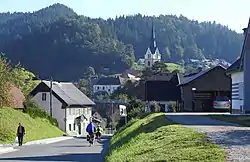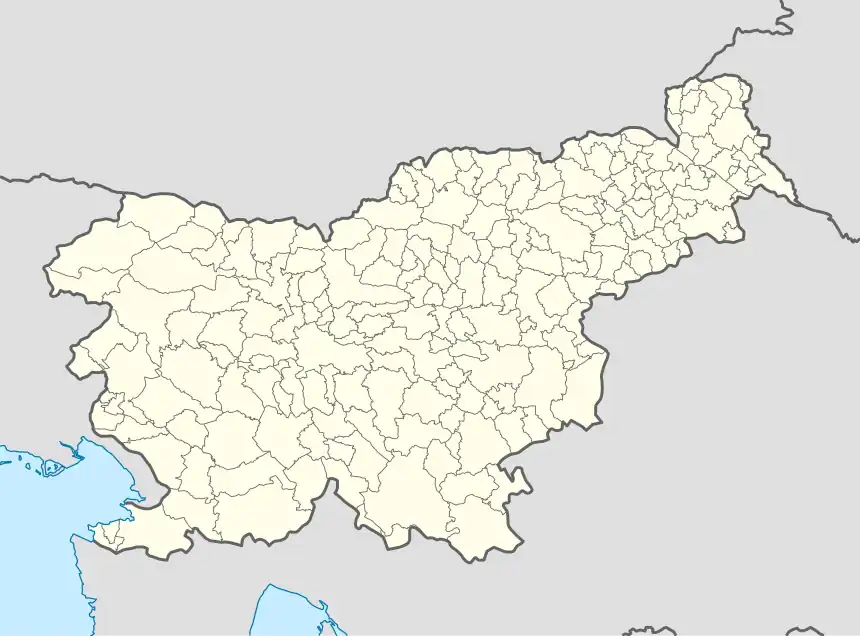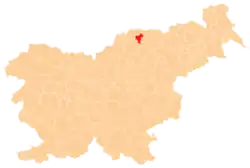Vuzenica
Vuzenica (pronounced [ʋuzɛˈniːtsa], German: Saldenhofen[4]) is a major settlement in northern Slovenia. It is the seat of the Municipality of Vuzenica. It lies on the right bank of the Drava River and extends south into the Pohorje Hills. The municipality is included in the Carinthia Statistical Region, which is in the Slovenian portion of the historical Duchy of Styria.[5]
Vuzenica | |
|---|---|
 | |
 Vuzenica Location in Slovenia | |
| Coordinates: 46°35′48″N 15°10′08″E | |
| Country | |
| Traditional region | Styria |
| Statistical region | Carinthia |
| Municipality | Vuzenica |
| Area | |
| • Total | 2.9 km2 (1.1 sq mi) |
| Elevation | 364.9 m (1,197.2 ft) |
| Population | |
| • Total | 1,522 |
| • Density | 520/km2 (1,400/sq mi) |
| [3] | |
History
Vuzenica was first mentioned as a settlement in written documents dating to 1238, but archaeological evidence shows the area was settled much earlier as a Roman period burial ground has been found there.[6] Of the 13th-century castle above the settlement, only parts of the walls survive.[7]
Anton Martin Slomšek
Anton Martin Slomšek (1800–1864) was a renowned Slovenian figure who served as a dean and parish priest in Vuzenica from 1838 to 1844. He advocated for the use of Slovene in education and made significant contributions in various fields, including agriculture, law, spirituality, nationality, education, enlightenment, and literature. Known for his influential and educational sermons, Slomšek authored notable works such as Mnemosynon Slavicum – Spomin slovenski and the widely known educational manual Blaže and Nežica in Sunday School during his tenure in Vuzenica.
The memorial museum dedicated to Anton Martin Slomšek is housed within the historic Vuzenica rectory building. The museum showcases original objects from Slomšek's time, including his writing desk and bed. Notable achievements by Slomšek include the construction of the Wallner Chapel, restoration projects of local buildings and cemeteries, and his contributions to education. A feature of the museum is a Baroque wooden ceiling, known as the "Vuzenica ceiling," dating back to 1653, with diverse motifs from the Baroque era. In addition, the museum space, partially reconfigured, serves as a library originally arranged by Slomšek and hosts cultural events.[8]
Church
The parish church in Vuzenica is dedicated to Saint Nicholas and belongs to the Roman Catholic Archdiocese of Maribor. It was built in the mid-13th century on the site of a 12th-century church. It was partly rebuilt and extended in the 14th and 15th centuries.[9] A second church is dedicated to the Virgin Mary and dates to the late 14th century.
References
- Razpotnik, Barica (2020-06-08). "On 1 January 2020, 2,095,861 residents of Slovenia lived in 5,978 settlements; 57 settlements were unpopulated" (Press release). Ljubljana: Statistical Office of the Republic of Slovenia. Retrieved 2021-01-09.
final data (XLS attachment)
- Prebivalci po spolu, občine in naselja, Slovenija, 1. januar 2020 [Population by sex, municipalities and resorts, Slovenia, 1 January 2020]. Statistical Office of the Republic of Slovenia (XLS) (in Slovenian). Ljubljana. 2020-06-08. Retrieved 2021-01-09.
(note: for Vuzenica, the municipality is at code 141, followed immediately by its settlements at codes 141001–141105)
- Statistical Office of the Republic of Slovenia
- Leksikon občin kraljestev in dežel zastopanih v državnem zboru, vol. 4: Štajersko. Vienna: C. Kr. Dvorna in Državna Tiskarna. 1904. p. 264.
- Vuzenica municipal site
- Slovenian Ministry of Culture register of national heritage reference number ešd 8133
- Slovenian Ministry of Culture register of national heritage reference number ešd 8141
- "Slomšek in Vuzenica (1838–1844)". Carinthian Regional Musem. Retrieved 25 June 2023.
- Slovenian Ministry of Culture register of national heritage reference number ešd 857
External links
 Media related to Vuzenica at Wikimedia Commons
Media related to Vuzenica at Wikimedia Commons- Vuzenica on Geopedia
